2015 Latest Braindump2go Microsoft 70-247 Dumps PDF Free Download (191-206)
Braindump2go Guarantees Your Microsoft 70-247 Exam 100% Success with Our Unique Official 70-247 Exam Questions Resources! Braindump2go’s 70-247 Braindumps are Developed by Experiences IT Certifications Professionals Working in Today’s Prospering Companies and Data Centers! Braindump2go 70-247 Exam Dumps are Checked by Our Experts Team every day to ensure you have the Latest Updated Exam Dumps!
Vendor: Microsoft
Exam Code: 70-247
Exam Name: Configuring and Deploying a Private Cloud with System Center 2012
QUESTION 191
Hotspot Question
You are the virtuaiization administrator for an organization.
You use System Center 2012 R2 Virtual Machine Manager (VMM) to configure a virtual machine (VM) template that will host a new application.
You have the following requirements for new VMs that host the application:
New VMs must be highly available.
You must join the VMs to an Active Directory Domain Services domain at deployment.
You need to modify the VM template to support the requirements.
On the properties page for the template, which two settings should you configure? To answer, select the appropriate settings in the answer area.
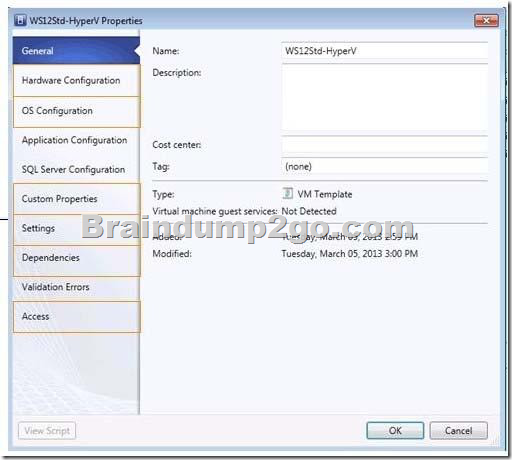
Answer:
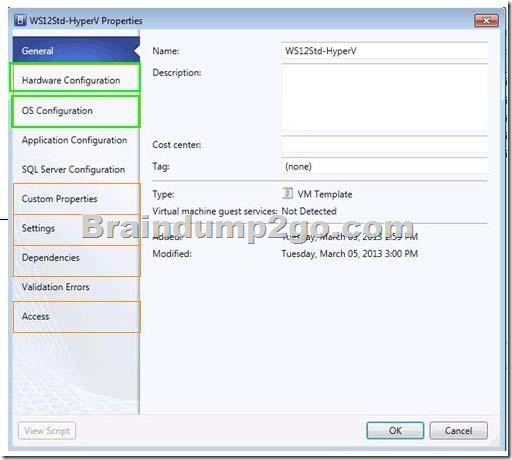
QUESTION 192
You have a Windows Server 2012 R2 Hyper-V environment that includes System Center 2012 R2 Virtual Machine Manager (VMM). The environment includes five physical servers.
The servers are configured as follows:

You plan to use VMM to migrate physical machines to virtual machines.
You must migrate all servers that support physical to virtual (P2V) migration.
You need to migrate the servers.
Which three servers should you migrate? Each correct answer presents part of the solution.
A. NYC-WEB
B. NYC-PR
C. NYC-DEV
D. NYC-FS
E. NYC-EX
Answer: ABC
Explanation:
The source computer cannot have any volumes larger than 2040 GB.
This disqualifies NYCFS( not D) and NYC-EX (not E).
Note:
* Requirements on the Source Machine To perform a P2V conversion, your source computer: /Must have at least 512 MB of RAM. / Cannot have any volumes larger than 2040 GB.
/ Must have an Advanced Configuration and Power Interface (ACPI) BIOS Vista WinPE will not install on a non-ACPI BIOS.
/ Must be accessible by VMM and by the host computer.
/ Cannot be in a perimeter network. A perimeter network, which is also known as a screened subnet, is a collection of devices and subnets placed between an intranet and the Internet to help protect the intranet from unauthorized Internet users. The source computer for a P2V conversion can be in any other network topology in which the VMM server can connect to the source machine to temporarily install an agent and can make Windows Management Instrumentation (WMI) calls to the source computer.
QUESTION 193
A company uses Windows Server 2012 R2 servers that have the Hyper-V role installed.
The company uses a single System Center 2012 R2 Data Protection Manager (DPM) server to back up and recover the Hyper-V environment.
You deploy a new standalone Hyper-V host server, and then deploy 20 new virtual machines (VMs) to the host server.
You create a DPM protection group named ProtectionGroup3.
You need to automate the process of adding the 20 new VMs to ProtectionGroup3.
What should you run?
A. the Windows PowerShell cmdlet Register-SCVMMManagedComputer
B. the Windows PowerShell cmdlet Update-SCVMMManagedComputer
C. the Windows PowerShell script AddNewStandAloneVM.ps1, and specify the Hyper-V server and
ProtectionGroup3 as parameters
D. the Windows PowerShell script AddNewStandAloneVMToDRServer.ps1, and specify the Hyper-V
server and ProtectionGroup3 as parameters
Answer: C
Explanation:
http://technet.microsoft.com/en-us/library/jj721498.aspx
QUESTION 194
Drag and Drop Question
A company uses System Center 2012 R2 Virtual Machine Manager (VMM) to manage their Hyper-V environment. The VMM environment has two host groups named Dev and Prod.
The Hyper-V environment has the following requirements:
– Administrators of the Prod host group must be able to manage virtual machines (VMs) and perform all VMM administrative tasks only within the Prod host group.
– Administrators of the Dev host group must be able to manage VMs and perform all VMM administrative tasks only within the Dev host group.
– Administrators of the Dev host group must be able to provision new Hyper-V host servers from physical computers for the Dev host group.
– The security administrators must be able to add user objects to the Administrator role in VMM.
– All delegation must adhere to the principle of least privilege.
You need to configure the user role profiles for each host group.
Which user role profiles should you assign? To answer, drag the appropriate user role profile to the correct user group. Each user role profile may be used once, more than once, or not at all. You may need to drag the split bar between panes or scroll to view content.
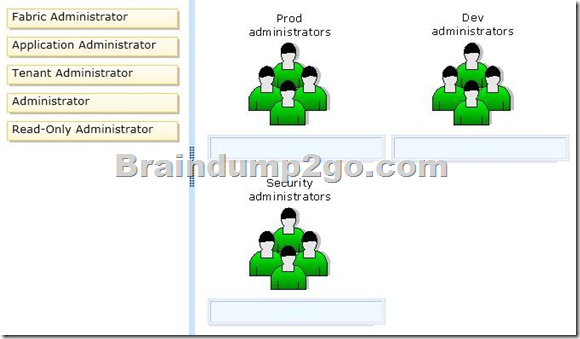
Answer:
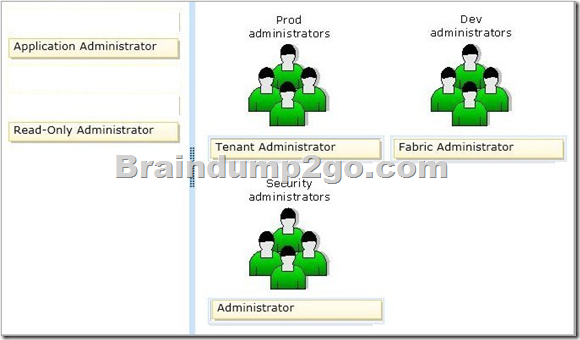
Explanation:
http://technet.microsoft.com/en-us/library/gg696971.aspx
QUESTION 195
Drag and Drop Question
You are the virtualization administrator for an organization, You manage a virtual machine (VM) by using System Center 2012 R2 Virtual Machine Manager. The VM is in a running state. You plan to use the System Preparation (Sysprep) tool to create a virtual machine template from the VM.
You need to save a copy of the VM before you run the Sysprep tool.
Which actions should you take? To answer, drag the appropriate actions to the correct locations in the answer area. Each action may be used once, more than once, or not at all. You may need to drag the split bar between panes or scroll to view content.

Answer:

QUESTION 196
You are the virtualization administrator for an organization that manages private and public cloud resources.
The organization has a Windows Azure subscription.
You plan to move victual machines to Windows Azure Infrastructure as a Service (IaaS) by using System Center 2012 R2 App Controller.
You need to create a virtual machine template that allows virtual machines to be moved from Hyper-V to Windows Azure.
What should you do?
A. Create a new virtual machine that uses a .vhd file.
Run the Sysprep tool on the virtual machine.
B. Create a new Generation 2 virtual machine that uses a .vhdx file that is attached to a SCSI controller.
Run the Sysprep tool on the virtual machine.
C. Create a new virtual machine that uses a .vhdx file.
Run the Sysprep tool on the virtual machine.
D. Create a virtual machine by using a differencing disk.
Use the Clone a virtual machine option to create new virtual machines.
Answer: A
Explanation:
http://blogs.msdn.com/b/how24/archive/2012/11/06/windows-azure-iaas-upload-a-custombuild-
vmtemplate.aspx
http://blogs.technet.com/b/kevinremde/archive/2013/05/29/migrating-vms-from-hyper-v-towindows-azure-20-key-scenarios-with-windows-azure-infrastructure-services.aspx
Note: Azure v1.7 and below does not support VHDX files
http://www.windowsazure.com/en-us/documentation/articles/virtual-machines-createupload-
vhd-windows-server/
QUESTION 197
You administer two Windows Server 2012 R2 servers that have the Hyper-V role installed.
You use System Center 2012 Virtual Machine Manager (VMM) to manage the Hyper-V host servers.
You need to create a server lab environment.
The lab servers have the following requirements:
– All of the lab servers must be virtual zed. All of the lab servers must be on an isolated network.
– All of the lab servers must be able to communicate with each other.
You need to configure networking for the lab environment.
What should you do?
A. Create a logical switch.
B. Create a media access control (MAC) pool.
C. Add a load balancer.
D. Create a private virtual LAN (PVLAN) logical network.
Answer: D
Explanation:
http://blogs.technet.com/b/scvmm/archive/2013/06/04/logical-networkspart-iv-pvlan-isolation.aspx
QUESTION 198
An organization uses System Center 2012 R2 Data Protection Manager (DPM). Backups of virtual machines that are hosted on local volumes complete successfully. Backups of virtual machines that are hosted on storage area network (SAN) volumes fail.
You receive the following error message in the Windows Event Log:
Backup failed with the following error An error occurred:
Writer ‘Microsoft Hyper-V VSS Writer’ reported an error: ‘VSS_WS_FAILED_AT_FREEZE’.
Check the application component to verify it is in a valid state for the operation.
You need to ensure that all backups can complete successfully.
What should you do?
A. On the Cluster Shared Volume (CSV), grant administrator rights to the DPM server computer account.
B. On all Windows servers in the environment, enable the Volume Shadow Copy Service (VSS).
C. Install and configure the Volume Shadow Copy Service (VSS) hardware provider from the SAN vendor.
D. On virtual machine files hosted on the Cluster Shared Volume (CSV), grant
Answer: C
Explanation:
http://technet.microsoft.com/en-us/library/hh758184.aspx
QUESTION 199
Contoso, Ltd. has a Windows Server 2012 R2 server with the Hyper-V role installed.
Contoso has a virtual machine named CVM1. The company uses System Center 2012 R2 Virtual Machine Manager (VMM) to manage the environment.
Contoso acquires Fabrikam, Inc. Fabrikam has a Windows Server 2012 R2 server with the Hyper-v role installed.
CVM1 must be able to communicate with a virtual machine named FVM2 on a non-routable subnet in the Fabrikam Hyper-V environment
You need to ensure that CVM1 can communicate with FVM2.
Which technology should you implement?
A. Remote Desktop (RD) Gateway
B. Windows Network Load Balancing (WNLB)
C. Windows Server Gateway
D. Reverse Proxy Server
Answer: C
Explanation:
http://technet.microsoft.com/en-us/library/dn313101.aspx
QUESTION 200
You administer an environment that uses a Windows Server 2012 R2 Hyper-V cluster and System Center 2012 R2 Virtual Machine Manager (VMM).
You plan to deploy two virtual machines (VMs) that host a lineof-business (LOS) application.
The VMs must reside on the same Hyper-V host server at all times.
The LOB application does NOT require high availability.
You need to deploy the VMs.
What should you do?
A. Add a custom property to both VMs, and assign the same value to each property.
Configure the Hyper-V host cluster to use the same custom property and value.
Configure a custom placement rule that uses filters that are based on the custom property and value.
B. Configure the VMs to use the same VM network.
C. Configure the VMs to reside on the same storage area networks (SANs).
D. Add a custom property to both VMs, and assign the same value to each property.
Configure the VMs as members of the same availability set.
Answer: A
Explanation:
http://blogs.technet.com/b/scvmm/archive/2013/03/11/custom-placement-rules-andavailability-
sets-in-scvmm-2012-sp1.aspx
QUESTION 201
You manage a virtualization environment that contains Windows Server 2012 R2 servers that have the Hyper-V role installed.
You manage the host servers by using Virtual Machine Manager (VMM) in System Center 2012 R2.
You must monitor the virtualization environment, including all virtual machines and service instances.
You need to configure monitoring.
Which three actions should you perform? Each correct answer presents part of the solution.
A. Import the VMM Management Pack and then deploy agents to the Hyper-V host servers and the
VMM server.
On the Hyper-V host server, enable agent proxy for the Operations Manager agent.
B. In the VMM console, add the name of an Operations Manager server to the management group
that will be used to monitor the virtualization infrastructure.
C. On the VMM server, install the Operations Manager console.
D. On the Operations Manager management server, enable Windows Remote Management (WinRM).
E. Import the VMM Management Pack and then deploy agents to Hyper-V host servers and the VMM Server.
On the VMM server, enable agent proxy for the Operations Manager agent.
F. Configure the VMM server and the Active Directory computer accounts of the Hyper-V host servers
to allow constrained delegation.
Answer: BCE
QUESTION 202
A company has a Windows Server 2012 R2 server that has the Hyper-V role installed.
The server hosts 12 virtual machines (VMs) that run Windows Server 2012 R2.
The company plans to deploy System Center 2012 R2 Data Protection Manager (DPM).
The company has identified the following requirements for the DPM deployment:
– Allow files and folders on VMs to be recovered allow recovery of data to a network
– Share minimize the number of DPM protection agents that you must deploy
You need to implement the backup solution.
Which two actions should you perform? Each correct answer presents part of the solution.
A. Deploy a DPM server.
B. Deploy the DPM protection agent to VMs.
C. Add the Hyper-V role to the DPM server.
D. Configure DPM to perform guest-level backups of the VMs.
E. Configure DPM to perform host-level backups of the VMs.
Answer: AC
Explanation:
* DPM protection supports the following scenarios:
/ (this scenario) Protects virtual machines that are hosted on stand-alone servers that run Hyper-V and that use local or directly attached storage.
/ Protects virtual machines that run on a cluster. The cluster uses Cluster Shared Volumes (CSV) storage. /Protects virtual machines that run on a stand-alone server or cluster and that use SMB 3.0 file server storage.
/Protects virtual machines that are running during a live migration.
* Example: Protection for virtual machines on a stand-alone server that is running Hyper-V
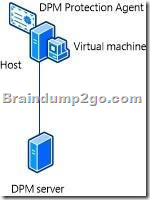
Hyper-V on Standalone This configuration protects one or more virtual machines on a stand-alone host computer. Storage can be local on the host server, or directly attached to it, for example a hard drive, a storage area network (SAN) device, or a network attached storage (NAS) device. Alternatively, the host server might use SMB 3.0 storage on an alternate file server. The DPM protection agent must be installed on all hosts and on the file server if storage is hosted by using SMB 3.0.
Incorrect: Not B: Would not minimize thenumber of Protection Agents.
QUESTION 203
Drag and Drop Question
You use System Center 2012 R2 Virtual Machine Manager (VMM) to manage a Hyper-V environment that consists of two host groups named Dev1 and Prod1.
It also has two private clouds named DevCloud and ProdCloud.
You have a self-service user role named DevVMAdmins. DevVMAdmins does NOT have the rights to perform any actions. DevVMAdmins must have the ability to start virtual machines (VMs), stop VMs, and shut down VMs. It must also be able to use resources from other self-service users.
You need to configure the DevVMAdmins user role.
How should you complete the relevant Windows PowerShell command? To answer, drag the appropriate Windows PowerShell segments to the correct locations in the cmdlet. Each Windows PowerShell segment may be used once, more than once, or not at all. You may need to drag the split bar between panes or scroll to view content.

Answer:

QUESTION 204
Drag and Drop Question
A company uses System Center 2012 R2 Virtual Machine Manager (VMM). You need to create and assign a self-service user role in VMM.
You have the following requirements:
– All role members must share ownership of all virtual machines (VMs) that any role member creates, Role members must be able to deploy VMs.
– Role members must NOT have authoring rights.
Which three actions should you perform in sequence? To answer, move the appropriate actions from the list of actions to the answer area and arrange them in the correct order.
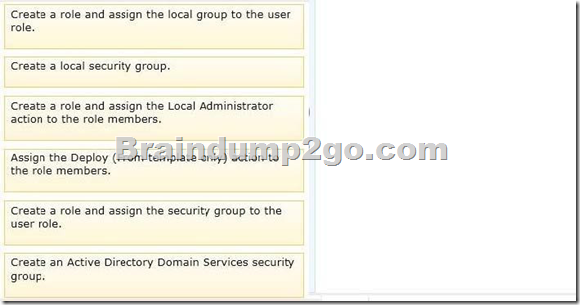
Answer:
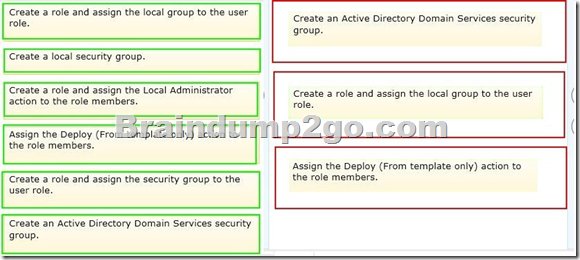
QUESTION 205
Drag and Drop Question
You are the virtualization administrator for an organization.
The organization uses all components of System Center 2012 R2 in its production environment.
You need to configure the environment to support Performance and Resource Optimization (PRO).
How should you configure the environment? To answer, drag the appropriate server role to the correct location or locations. Each server role may be used once, more than once, or not at all. You may need to drag the split bar between panes or scroll to view content.
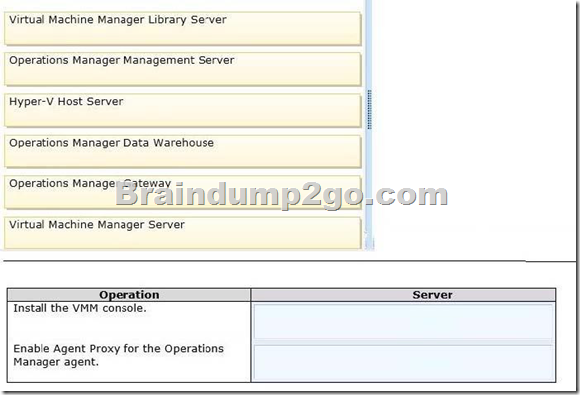
Answer:
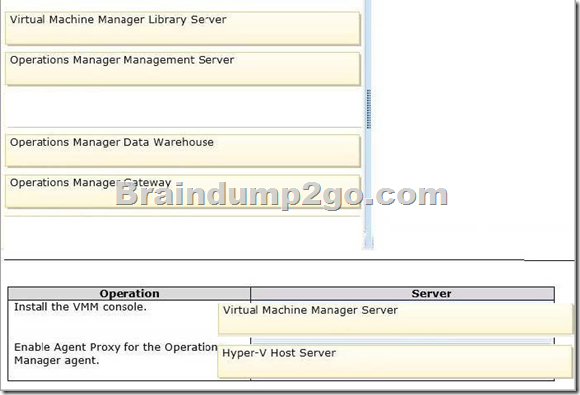
QUESTION 206
Drag and Drop Question
You administer a Hyper-V environment that uses Windows Server 2012 R2 and System Center 2012 R2 Virtual Machine Manager (VMM). A line-of-business (LOB) application requires two virtual machines (VMs).
Each VM must have direct access to existing Fibre Channel storage.
You need to ensure that the two VMs have direct access to Fibre Channel storage.
Which three actions should you perform in sequence? To answer, move the appropriate actions from the list of actions to the answer area and arrange them in the correct order.

Answer:
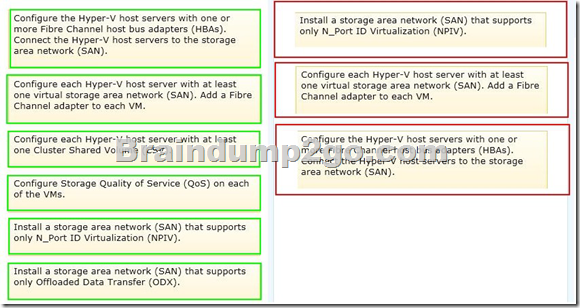
Braindump2go New Updated 70-247 Exa Dumps are Complete Microsoft 70-247 Course Coverage! 100% Real Questions and Correct Answers Guaranteed! Updated 70-247 Preparation Material with Questions and Answers PDF Instant Download:

